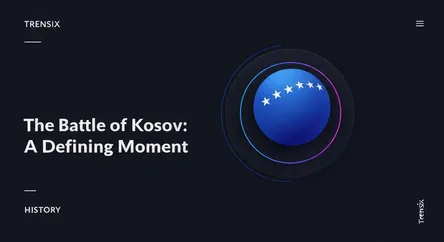History
The Battle of Kosovo: A Defining Moment

An explanation of the 1389 Battle of Kosovo, a pivotal event in Balkan history that shaped Serbian national identity and continues to resonate today.
What is it?
The Battle of Kosovo was fought on June 15, 1389, on the Kosovo field, near modern-day Pristina. It pitted a coalition army of Balkan forces led by Serbian Prince Lazar Hrebeljanović against the invading army of the Ottoman Empire commanded by Sultan Murad I. It was one of the largest battles of the late Middle Ages. While historical accounts vary, the battle resulted in immense casualties for both sides. Critically, both army commanders, Prince Lazar and Sultan Murad I, were killed. Although the immediate result was inconclusive, the devastating losses crippled Serbia's ability to resist further invasions, ultimately leading to it becoming a vassal state of the Ottoman Empire.
Why is it trending?
The Battle of Kosovo maintains its relevance not as a passing trend but as a foundational event in the national consciousness of the Balkans. For Serbs, it evolved into the "Kosovo Myth," a narrative portraying the physical defeat as a moral and spiritual victory where Prince Lazar chose a heavenly kingdom over an earthly one. This story became a cornerstone of Serbian national identity, especially during the 19th-century struggle for independence from the Ottomans. In modern times, the battle's memory was powerfully invoked by political figures like Slobodan Milošević to fuel Serbian nationalism during the breakup of Yugoslavia.
How does it affect people?
The battle's legacy profoundly impacts the peoples of the Balkans. For many Serbs, it is a sacred symbol of martyrdom, resilience, and national identity, commemorated annually on St. Vitus' Day (Vidovdan). However, the narrative is contested. Albanians also claim participation in the battle against the Ottomans and view the Serbian nationalist focus on the event as a tool to assert historical dominance over the territory of Kosovo. These conflicting interpretations have fueled ethnic tensions and played a significant role in modern political disputes, including the Kosovo War in the late 1990s, making the 600-year-old battle a still-potent symbol in the region.